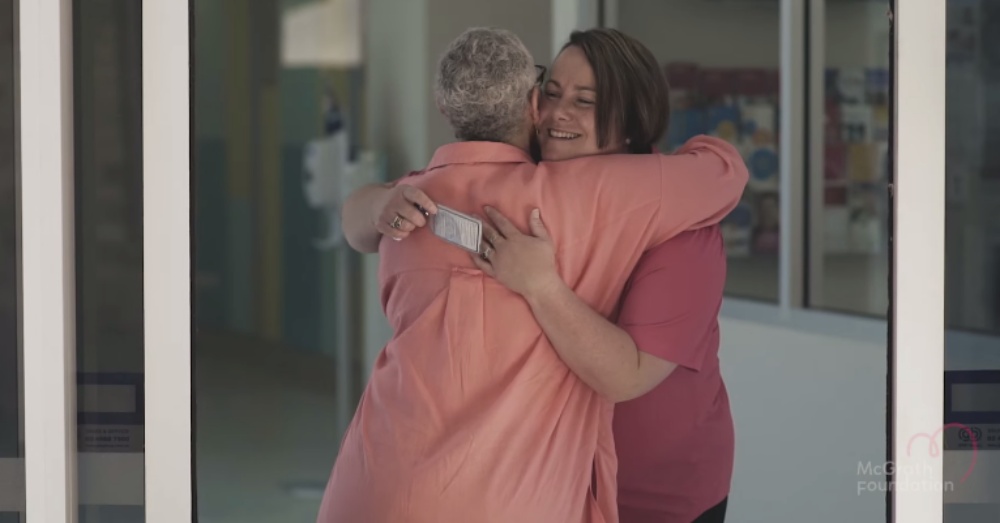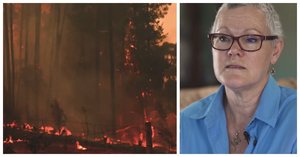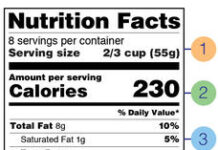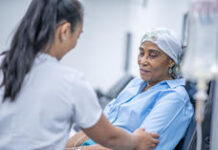Lisa Hardman went through a lot in the span of one year: drought, a breast cancer diagnosis, and then the loss of much of her property due to a raging bushfire.“If I was going to be totally blunt, I’d say it’s been a shit year,” Lisa said.The mother-of-three and her husband, Paul, live in Ebor, New South Wales, a small village that is located near a gorgeous tiered waterfall called Ebor Falls. Lisa and Paul own a 280-hectare farm there, and have three children: Hannah, Mackenzie, and Cooper. They primarily raise cattle on their property, and it borders the gorge near Ebor Falls. Photo: Facebook/McGrath Foundation
Photo: Facebook/McGrath Foundation
However, unrelenting droughts have wreaked havoc on their land over the past few years. The Hardmans were forced to sell most of their cattle in 2019.“Having come here in such a lush environment, with grass knee-high, it’s incredibly devastating not just for us but for other farmers in the region to see the land like this,” Lisa said.In March of that same year, Lisa was diagnosed with breast cancer. She spent the next several months traveling to different cities for treatment, which included chemotherapy and radiation. Photo: Facebook/McGrath FoundationIt’s an understatement to say that it was a stressful time for Lisa. Thankfully, she had a little extra support. Rachael Stevens is a McGrath breast care nurse at Armidale Hospital, where Lisa underwent treatment.
Photo: Facebook/McGrath FoundationIt’s an understatement to say that it was a stressful time for Lisa. Thankfully, she had a little extra support. Rachael Stevens is a McGrath breast care nurse at Armidale Hospital, where Lisa underwent treatment.
Rachael is part of a network of nurses sponsored by the McGrath Foundation. These nurses care for breast cancer patients throughout Australia physically, psychologically, and emotionally — for free.Jane McGrath, the founder of the foundation, was 31 when she was first diagnosed with breast cancer. Her relationship with her breast cancer nurse inspired her and her husband to create the McGrath Foundation to help thousands of men and women fighting breast cancer by providing specialized breast cancer nurses. On top of that, they raise money to make this care free, to ensure that patients don’t have to have a certain income to be able to benefit from much-needed support. Photo: Facebook/McGrath Foundation
Photo: Facebook/McGrath Foundation
Rachael helped Lisa from the start.“Rachael has always been there,” Lisa said. “One of the first things she said was I can call any time, even in the middle of the night if I just wanted to leave a message screaming expletives down the phone. It was nice to have someone I could talk to without an emotional attachment, especially during the more stressful times. It’s quite a special relationship, a special one that’s given to you.” Photo: Facebook/McGrath FoundationThe first dose of chemo wrecked Lisa.“By the end of the week I was in a lot of pain, my digestive tract was burning and I couldn’t walk,” she said. “After that I said, ‘I’m not doing it.’ I said, ‘I’m finished with it.’”So Paul contacted Rachael and asked for help. Rachael helped Lisa manage the side effects, and was a sounding board for all of her concerns.
Photo: Facebook/McGrath FoundationThe first dose of chemo wrecked Lisa.“By the end of the week I was in a lot of pain, my digestive tract was burning and I couldn’t walk,” she said. “After that I said, ‘I’m not doing it.’ I said, ‘I’m finished with it.’”So Paul contacted Rachael and asked for help. Rachael helped Lisa manage the side effects, and was a sounding board for all of her concerns.
 Photo: Facebook/McGrath FoundationIn November, Lisa completed her last round of radiation.That same week, a bushfire ravaged most of their property — about 200 hectares — including trees and feeding areas for their remaining cattle.“On the 14th of November, the Ebor fire swept through, which was really scary,” she said. “It was hot, and it was fast.”
Photo: Facebook/McGrath FoundationIn November, Lisa completed her last round of radiation.That same week, a bushfire ravaged most of their property — about 200 hectares — including trees and feeding areas for their remaining cattle.“On the 14th of November, the Ebor fire swept through, which was really scary,” she said. “It was hot, and it was fast.” Photo: Facebook/McGrath Foundation
Photo: Facebook/McGrath Foundation
Their land doesn’t look the same.“It’s like a moonscape, just grey ash and dust everywhere,” Lisa said. Photo: Facebook/McGrath FoundationThe Hardmans are doing their best to stay positive — and one big shining light is that Lisa is done with treatment.Learn more in this video.Proper BCS greatergood_ctg_abovevideoSource
Photo: Facebook/McGrath FoundationThe Hardmans are doing their best to stay positive — and one big shining light is that Lisa is done with treatment.Learn more in this video.Proper BCS greatergood_ctg_abovevideoSource







